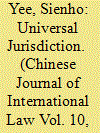|
|
|
Sort Order |
|
|
|
Items / Page
|
|
|
|
|
|
|
| Srl | Item |
| 1 |
ID:
187407


|
|
|
|
|
| Summary/Abstract |
On 31 October 2021, an agreement was signed between Antigua and Barbuda and Tuvalu that established a commission with the power to request an advisory opinion from the International Tribunal for the Law of the Sea (ITLOS). Since ITLOS’s advisory jurisdiction has been tested in only one case, I explain and evaluate the procedural obstacles facing this commission, as well as the potential questions it might submit to ITLOS. The analysis draws upon the jurisprudence of the International Court of Justice to indicate how ITLOS could articulate and apply its jurisdiction in an advisory case. I conclude that although there appear to be few insurmountable obstacles to securing ITLOS’s jurisdiction, care must be taken by the Commission of Small Island States on Climate Change and International Law to ensure that the questions presented to ITLOS are carefully drafted so that ITLOS has no concerns over the judicial propriety of giving an advisory opinion.
|
|
|
|
|
|
|
|
|
|
|
|
|
|
|
|
| 2 |
ID:
183188


|
|
|
|
|
| Summary/Abstract |
The United Nations embraced the doctrine of “Responsibility to Protect” (R2P) in 2005, which states that it is a shared responsibility of the international community to protect peoples from the atrocities of war crimes, crimes against humanity, ethnic cleansing, and genocide. Regarding Myanmar, the UN Human Rights Council claimed there were gross violations of human rights and international law in Myanmar's Rakhine state. Also, the UN Independent Fact-Finding Mission found evidence of genocide, crimes against humanity, and war crimes, and accordingly requested that the international community employ R2P to protect the Rohingya people. The UN High Commissioner for Human Rights acknowledged the clearance operation that occurred on 25 August 2017 at the hands of the Myanmar military regime was a “textbook example of ethnic cleansing”. In spite of this, the international community has taken no effective measures to protect the Rohingya community from what was an “entirely predictable” act of genocide. This paper is a qualitative investigation, a review of possible strategic reasons for why the international community has failed to protect the Rohingya. The paper relies on secondary scholarly literature, policy records, UN, government, and NGO reports, grey literature sources, and online materials. ASEAN's non-interference strategy, the OIC's dependency on diplomacy, the EU's priority for the hybrid democratic transition of Myanmar, the UN's political dialogue strategy, and the UN Security Council's structural weaknesses are obstacles to the international community preventing genocide in Myanmar. This study contributes to understanding the strategies of ASEAN, OIC, EU, UN, ICC, and the ICJ in relation to the Rohingya issue. It examines the chances of these organisations championing R2P, and also considers whether the Rohingya crisis is too intractable or difficult to resolve under current arrangements.
|
|
|
|
|
|
|
|
|
|
|
|
|
|
|
|
| 3 |
ID:
106860


|
|
|
|
|
| Publication |
2011.
|
| Summary/Abstract |
The debates in the UNGA since 2009 on universal jurisdiction reveal great confusion on its concept, scope and application. True or pure universal jurisdiction is jurisdiction solely based on the universal concern character of the crime in issue. The concept and logic of universal jurisdiction is understandable, as each State has an interest in matters of universal concern. Universal jurisdiction can be a powerful instrument for the international system to protect its interests and to protect human rights and fight against impunity. However, the exercise of universal jurisdiction by one State may infringe the sovereignty and sovereign equality of another State and can be abused, thus destabilizing international relations. These pros and cons and other factors have influenced the international law formation process in such a way that so far only universal jurisdiction over piracy has been accepted in international law. There is no "pure universal concern jurisdiction" over other crimes yet. The evidence of State practice on "universal concern plus presence" jurisdiction is not yet substantial so as to afford the finding of a customary international law rule in its favor. Treaty practice providing for "universal concern plus treaty, presence and intra-regime territoriality or nationality jurisdiction" or "universal concern plus treaty and presence jurisdiction" is limited to the particular treaty regime only. In the light of this state of affairs, the possible application of the Lotus dictum and the presence requirement-especially the weak, procedural view of it-can be of significance and deserves attention. The movement for "pure universal jurisdiction" has been "trending down" since the conspicuous silence on the legitimacy of universal jurisdiction in the Arrest Warrant case decided by the ICJ in 2002. The subsequent downtrend may have been in no small measure due to the cautious Judgment in that case. That Judgment can be said to have, in an ingenious way, helped to inject some calming elements back into international relations. With Belgium and Spain now having abandoned pure universal jurisdiction by narrowing down their statutes, the universal jurisdiction movement appears to be a moving train without its locomotive.
|
|
|
|
|
|
|
|
|
|
|
|
|
|
|
|
|
|
|
|
|